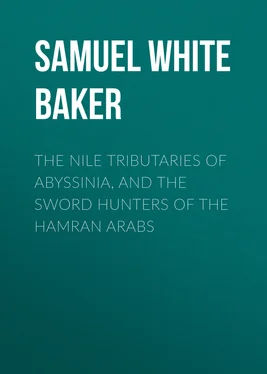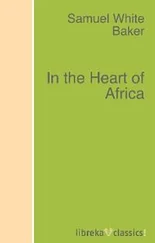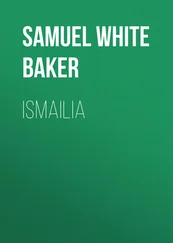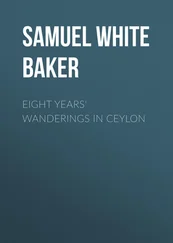Samuel White Baker - The Nile Tributaries of Abyssinia, and the Sword Hunters of the Hamran Arabs
Здесь есть возможность читать онлайн «Samuel White Baker - The Nile Tributaries of Abyssinia, and the Sword Hunters of the Hamran Arabs» — ознакомительный отрывок электронной книги совершенно бесплатно, а после прочтения отрывка купить полную версию. В некоторых случаях можно слушать аудио, скачать через торрент в формате fb2 и присутствует краткое содержание. Жанр: Путешествия и география, История, foreign_edu, foreign_antique, foreign_prose, на английском языке. Описание произведения, (предисловие) а так же отзывы посетителей доступны на портале библиотеки ЛибКат.
- Название:The Nile Tributaries of Abyssinia, and the Sword Hunters of the Hamran Arabs
- Автор:
- Жанр:
- Год:неизвестен
- ISBN:нет данных
- Рейтинг книги:3 / 5. Голосов: 1
-
Избранное:Добавить в избранное
- Отзывы:
-
Ваша оценка:
- 60
- 1
- 2
- 3
- 4
- 5
The Nile Tributaries of Abyssinia, and the Sword Hunters of the Hamran Arabs: краткое содержание, описание и аннотация
Предлагаем к чтению аннотацию, описание, краткое содержание или предисловие (зависит от того, что написал сам автор книги «The Nile Tributaries of Abyssinia, and the Sword Hunters of the Hamran Arabs»). Если вы не нашли необходимую информацию о книге — напишите в комментариях, мы постараемся отыскать её.
The Nile Tributaries of Abyssinia, and the Sword Hunters of the Hamran Arabs — читать онлайн ознакомительный отрывок
Ниже представлен текст книги, разбитый по страницам. Система сохранения места последней прочитанной страницы, позволяет с удобством читать онлайн бесплатно книгу «The Nile Tributaries of Abyssinia, and the Sword Hunters of the Hamran Arabs», без необходимости каждый раз заново искать на чём Вы остановились. Поставьте закладку, и сможете в любой момент перейти на страницу, на которой закончили чтение.
Интервал:
Закладка:
The following day's march led us through the same dead level of grassy plains and mimosas, enlivened with numerous herds of ariels and large black-striped gazelles (Dorcas), one of which I succeeded in shooting for my people. After nine hours' journey we arrived at the, valley of the Atbara, in all sixteen hours' actual marching from Cassala.
There was an extraordinary change in the appearance of the river between Gozerajup and this spot. There was no longer the vast sandy desert with the river flowing through its sterile course on a level with the surface of the country, but after traversing an apparently perfect flat of forty-five miles of rich alluvial soil, we had suddenly arrived upon the edge of a deep valley, between five and six miles wide, at the bottom of which, about 200 feet below the general level of the country, flowed the river Atbara. On the opposite side of the valley, the same vast table lands continued to the western horizon.
We commenced the descent towards the river; the valley was a succession of gullies and ravines, of landslips and watercourses; the entire hollow, of miles in width, had evidently been the work of the river. How many ages had the rains and the stream been at work to scoop out from the flat table land this deep and broad valley? Here was the giant labourer that had shovelled the rich loam upon the delta of Lower Egypt! Upon these vast flats of fertile soil there can be no drainage except through soakage. The deep valley is therefore the receptacle not only for the water that oozes from its sides, but subterranean channels, bursting as land-springs from all parts of the walls of the valley, wash down the more soluble portions of earth, and continually waste away the soil. Landslips occur daily during the rainy season; streams of rich mud pour down the valley's slopes, and as the river flows beneath in a swollen torrent, the friable banks topple down into the stream and dissolve. The Atbara becomes the thickness of pea-soup, as its muddy waters steadily perform the duty they have fulfilled from age to age. Thus was the great river at work upon our arrival on its bank at the bottom of the valley. The Arab name, "Bahr el Aswat" (black river) was well bestowed; it was the black mother of Egypt, still carrying to her offspring the nourishment that had first formed the Delta.
At this point of interest, the journey had commenced; the deserts were passed, all was fertility and life: wherever the sources of the Nile might be, the Atbara was the parent of Egypt! This was my first impression, to be proved hereafter.
CHAPTER V
THE STORM
A VIOLENT thunderstorm, with a deluge of rain, broke upon our camp upon the banks of the Atbara, fortunately just after the tents were pitched. We thus had an example of the extraordinary effects of the heavy rain in tearing away the soil of the valley. Trifling watercourses were swollen to torrents; banks of earth became loosened and fell in, and the rush of mud and water upon all sides swept forward into the river with a rapidity which threatened the destruction of the country, could such a tempest endure for a few days. In a couple of hours all was over. The river was narrower than in its passage through the desert, but was proportionately deeper. The name of the village on the opposite bank was Goorashee, with which a means of communication had been established by a ferry-boat belonging to our friend and late host, Malem Georgis, the Greek merchant of Cassala. He had much trouble in obtaining permission from the authorities to introduce this novelty, which was looked upon as an innovation, as such a convenience had never before existed. The enterprising proprietor had likewise established a cotton farm at Goorashee, which appeared to succeed admirably, and was an undeniable example of what could be produced in this fertile country were the spirit of improvement awakened. Notwithstanding the advantage of the ferry-boat, many of the Arabs preferred to swim their camels across the river to paying a trifle to the ferryman. A camel either cannot or will not swim unless it is supported by inflated skins: thus the passage of the broad river Atbara (at this spot about 300 yards wide) is an affair of great difficulty. Two water-skins are inflated, and attached to the camel by a band passed like a girth beneath the belly. Thus arranged, a man sits upon its back, while one or two swim by the side as guides. The current of the Atbara runs at a rapid rate; thus the camel is generally carried at least half a mile down the river before it can gain the opposite bank. A few days before our arrival, a man had been snatched from the back of his camel while crossing, and was carried off by a crocodile. Another man had been taken during the last week while swimming the river upon a log. It was supposed that these accidents were due to the same crocodile, who was accustomed to bask upon a mud bank at the foot of the cotton plantation. On the day following our arrival at the Atbara, we found that our camel-drivers had absconded during the night with their camels; these were the men who had been forced to serve by the Governor of Cassala. There was no possibility of proceeding for some days, therefore I sent El Baggar across the river to endeavour to engage camels, while I devoted myself to a search for the crocodile. I shortly discovered that it was unfair in the extreme to charge one particular animal with the death of the two Arabs, as several large crocodiles were lying upon the mud in various places. A smaller one was lying asleep high and dry upon the bank; the wind was blowing strong, so that, by carefully approaching, I secured a good shot within thirty yards, and killed it on the spot by a bullet through the head, placed about an inch above the eyes.
After some time, the large crocodiles, who had taken to the water at the report of the gun, again appeared, and crawled slowly out of the muddy river to their basking-places upon the bank. A crocodile usually sleeps with its mouth wide open; I therefore waited until the immense jaws of the nearest were well expanded, showing a grand row of glittering teeth, when I crept carefully towards it through the garden of thickly-planted cotton. Bacheet and Wat Gamma followed in great eagerness. In a short time I arrived within about forty yards of the beast, as it lay upon a flat mud bank formed by one of the numerous torrents that had carried down the soil during the storm of yesterday. The cover ceased, and it was impossible to approach nearer without alarming the crocodile; it was a fine specimen, apparently nineteen or twenty feet in length, and I took a steady shot with the little Fletcher rifle at the temple, exactly in front of the point of union of the head with the spine. The jaws clashed together, and a convulsive start followed by a twitching of the tail led me to suppose that sudden death had succeeded the shot; but, knowing the peculiar tenacity of life possessed by the crocodile, I fired another shot at the shoulder, as the huge body lay so close to the river's edge that the slightest struggle would cause it to disappear. To my surprise, this shot, far from producing a quietus, gave rise to a series of extraordinary convulsive struggles. One moment it rolled upon its back, lashed out right and left with its tail, and ended by toppling over into the river.
This was too much for the excitable Bacheet, who, followed by his friend, Wat Gamma, with more courage than discretion, rushed into the river, and endeavoured to catch the crocodile by the tail. Before I had time to call them back, these two Arab water-dogs were up to their necks in the river, screaming out directions to each other while they were feeling for the body of the monster with their feet. At length I succeeded in calling them to shore, and we almost immediately saw the body of the crocodile appear belly upwards, about fifty yards down the stream; the forepaws were above the water, but, after rolling round several times, it once more disappeared, rapidly carried away by the muddy torrent. This was quite enough for the Arabs, who had been watching the event from the opposite bank of the river, and the report quickly spread that two crocodiles were killed, one of which they declared to be the public enemy that had taken the men at the ferry, but upon what evidence I cannot understand. Although my Arabs looked forward to a dinner of crocodile flesh, I was obliged to search for something of rather milder flavour for ourselves. I waited for about an hour while the first crocodile was being divided, when I took a shot gun and succeeded in killing three geese and a species of antelope no larger than a hare, known by the Arabs as the Dik-dik (Nanotragus Hemprichianus). This little creature inhabits thick bush. Since my return to England, I have seen a good specimen in the Zoological Gardens of the Regent's Park.
Читать дальшеИнтервал:
Закладка:
Похожие книги на «The Nile Tributaries of Abyssinia, and the Sword Hunters of the Hamran Arabs»
Представляем Вашему вниманию похожие книги на «The Nile Tributaries of Abyssinia, and the Sword Hunters of the Hamran Arabs» списком для выбора. Мы отобрали схожую по названию и смыслу литературу в надежде предоставить читателям больше вариантов отыскать новые, интересные, ещё непрочитанные произведения.
Обсуждение, отзывы о книге «The Nile Tributaries of Abyssinia, and the Sword Hunters of the Hamran Arabs» и просто собственные мнения читателей. Оставьте ваши комментарии, напишите, что Вы думаете о произведении, его смысле или главных героях. Укажите что конкретно понравилось, а что нет, и почему Вы так считаете.












